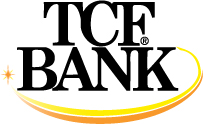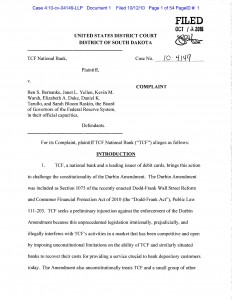 TCF National Bank (a subsidiary of TCF Financial Corporation NYSE:TCB), today publicly announced the filing of a lawsuit against the Federal Reserve, seeking a preliminary injunction preventing the enforcement of the Durbin Amendment. Congress included the Durbin Amendment, without hearings, in the Wall Street Reform and Consumer Financial Protection Act of 2010. Read more about the lawsuit here…
TCF National Bank (a subsidiary of TCF Financial Corporation NYSE:TCB), today publicly announced the filing of a lawsuit against the Federal Reserve, seeking a preliminary injunction preventing the enforcement of the Durbin Amendment. Congress included the Durbin Amendment, without hearings, in the Wall Street Reform and Consumer Financial Protection Act of 2010. Read more about the lawsuit here…
In a press release today, TCF National Bank announced “TCF Bank Files Lawsuit Challenging The Durbin Amendment of the Dodd-Frank Act”. The suit seeks an injunction preventing the Federal Reserve from enforcing the Durbin Amendment.
In a conference call discussing the motivation behind the suit, TCF’s CEO stated that they filed the “preliminary injunction against the enforcement of the Durbin Amendment because this unprecedented legislation irrationally, prejudicially, and illegally interferes with TCF’s activities in a market that has been competitive and open by imposing unconstitutional limitations on the ability of TCF and similarly situated banks to recover their costs for providing a service crucial to bank depository customers today.”
Further, TCF’s CEO mentioned that “everyone is afraid of the government – we [TCF] don’t want to sit back and let our customers pay the price for this. We want to represent our own interests on this issue.”
The complaint was filed in U.S. District Court in South Dakota and is assigned Case No. 4:10-cv-04149-LLP. A copy of the complaint is available here. The complaint is a fascinating read. A summary of some of the relevant sections follows (items in bold are ours, other paragraphs are quotes from the complaint).
Introduction
The Amendment kills profitability of many debit card programs: Under the literal terms of the Amendment, a debit card issuing bank will only be able to recover “‘incremental” electronic processing costs related to a particular transaction; all other costs of operating a debit card program-which are the bulk of the actual costs-inc1uding substantial variable and fixed, or “sunk” costs, may not be recovered. The allowable costs are so negligible that regulated debit card issuers will not be able to recover the true expense of providing debit card services to customers.
The Amendment draws an arbitrary line…: The provision is also arbitrarily limited to banks with assets of $10 billion or more, thus exempting 99 percent of banks, savings institutions, and credit unions that issue debit cards, and leaving TCF and other covered debit card issuers to shoulder the entire burden of this poorly conceived legislation. As a result of this discriminatory classification, TCF and similarly situated banks will not be able to compete on even ground with the thousands of banks, savings institutions, and credit unions with assets under $10 billion that are exempt from the rate regulations required by the Durbin Amendment.
TCF was forced to act… or sit back and hurt shareholders…:
Thus, the Durbin Amendment puts TCF and similarly-situated debit card
issuing banks at a crossroads. TCF can wait to challenge the Durbin Amendment after the forthcoming rulemaking process, or act now in light of the certainty that no rules that faithfully administer the Amendment will allow TCF to maintain a profitab1e debit card operation.
The only suitable relief is a full injunction….:
The temporary relief sought here is based on the practical reality that any interchange fee schedule that the Board adopts for debit cards consistent with the explicit statutory requirements of the Durbin Amendment will necessarily fail to supply TCF with full protection of its constitutional rights. The massive disruption that the Durbin Amendment imposes on debit card practices, without any hearings or careful examination in Congress, fully justifies the issuance of the preliminary injunction herein sought.
About TCF
TCF’s “Totally Free Checking” is totally free, partly thanks to debit card interchange…
At every step on this path [of providing free checking], TCF consciously made its checking account functionality-and especially its debit card feature-as inexpensive and convenient to the consumer as possible. TCF’s consumer-oriented strategy, which is now threatened by the Durbin Amendment, has been extremely successful with customers. Today, TCF has over $18 billion in assets and is the 47th largest commercial bank in the United States by assets; at the same time, TCF is the 12th largest issuer of Visa debit cards. Each month, over 800,000 TCF customers use their TCF debit cards. Last year, TCF customers “swiped” their cards over 200 million times. From that activity, TCF received debit card interchange revenue of just over $100 million, from a swipe fee that amounts to a little less than 50? per average transaction of about $35.
How Durbin will impact TCF customers…
If TCF dropped its debit card feature or tried to charge its customers any sum, however small, for debit cards, customers-who are otherwise perfectly satisfied with TCF-would take their business to one of the 99 percent of banks, savings institutions, or credit unions that are exempt from the Durbin Amendment. Thus, the Durbin Amendment irrationally and arbitrarily discriminates against TCF and similarly situated banks that will suffer a drastic and immediate drop in revenues when new rates become effective.
The Durbin Amendment’s Origins and Coverage
A retailer’s complaints trigger Durbin’s actions…
The genesis of the Durbin Amendment, as Senator Durbin has publicly
confirmed, was a pitch by one of his Illinois constituents, Gregory D. Wassen, the Chief Executive Officer ofWalgreens, who apparently complained that Walgreens’ credit card interchange fees were too high. Walgreens, which is headquartered in Deerfield, Illinois, is the largest drugstore owner and operator in the country. As Senator Durbin explained in a May 5, 2010 floor speech, “I talked to a CEO of a major drugstore chain yesterday, and he told me his top four expenses for his nationwide chain of drugstores: No.1, salaries; No.2, what he called mortgages and rent; No.3, health care; No.4, interchange fees-the amount of money his company pays to credit card companies.”
Only large banks are impacted…
The net result of all of these exemptions is that a tiny percentage of all issuing banks will shoulder the entire burden of the Durbin Amendment. As an added slap, and demonstrating the total irrationality of the Amendment and its complete disconnect from the original purpose of the EFTA, no part of the Amendment requires retailers to pass even a penny of the windfall gains they will receive under the law on to consumers in the form of lower prices. This point has not gone unnoticed. On the passage of the Durbin Amendment, The Wall Street Journal, for example, reported that “Wal-Mart stores alone, the world’s largest retailer, [will save] hundreds of millions annually.”
TCF’s Constitutional Arguments
The Durbin Amendment deprives TCF of substantive due process…
The Durbin Amendment arbitrarily and irrationally deprives TCF of its constitutionally-guaranteed property right to recover costs plus a reasonable return on the capital invested in its extensive, debit card operation. The statute instructs the Board to set interchange rates solely by reference to the “incremental costs” of authorizing, clearing, or settling each debit transaction, while expressly prohibiting the Board from considering all the “other costs” incurred by TCF in administering its overall debit card program. The “incremental costs” the Board may consider when setting TCF’s interchange fee rate constitute only a small fraction of TCF’s “other costs” associated with the design, construction, organization, maintenance, operation, and upgrade of TCF’s debit card system. The price control affected by the Durbin Amendment is arbitrary, discriminatory, and demonstrably irrelevant to the purported purpose of reducing interchange fees imposed by card companies and debit network operators.
The Durbin Amendment is an Unlawful Regulatory Taking …
By singling out banks with assets of $10 billion or more and instructing the Board to set interchange rates solely by reference to the “incremental costs” of authorizing, clearing, or settling debit card transactions, the Durbin Amendment (1) necessarily precludes TCF from recovering its costs plus a reasonable return on the capital it has invested in its debit card operation; (2) frustrates TCF’s ability to compete on even ground with the exempt banks, savings and loans, and credit unions; and (3) singles out a small number of banks, including TCF, to bear a substantial competitive and financial burden. The Durbin Amendment therefore effects an unconstitutional taking of TCF’s property without just compensation in violation of the Fifth Amendment of the U.S. Constitution.
The Durbin Amendment Denies TCF Equal Protection…
TCF is denied the equal protection of law as guaranteed by the Fifth Amendment because the Durbin Amendment’s distinction between banks and other card issuers with assets of less than $10 billion and banks and other card issuers with assets of $10 billion or greater is not rationally related to a legitimate government purpose. By its terms, the Durbin Amendment exempts 99 percent of the debit card issuing banks in the country from the regulations it imposes on TCF and fewer than 100 other banks. This exemption for smaller institutions arbitrarily grants them an insuperable competitive advantage denied to TCF. The Amendment does not regulate fees charged by debit network operators or credit card companies, the purported goal of the legislation. No conceivable state of facts could provide a rational basis for the impact of this legislation.
Senator Durbin Responds
Senator Durbin today issued a statement in response to the lawsuit, stating:
“TCF’s complaint not only fundamentally misunderstands the law regarding interchange fees, but it also ignores the facts,” Durbin said. “The law in no way addresses the fees TCF, or any other bank, can charge and it does not set interchange rates. Our language simply ensures that debit interchange fees charged to retailers by the card networks not the banks – are reasonable and proportional’ to the cost of processing transactions and provides competition in an area of the market where there’s none.
Congress approved this language by a wide bipartisan margin in reaction to the frustrations of millions of merchants and consumers who were getting nickled and dimed by the anticompetitive interchange system set up by big banks and credit card companies including TCF. I look forward to this provision’s day in court and am confident that our language will be found to be fair and Constitutional.”

Comments are closed